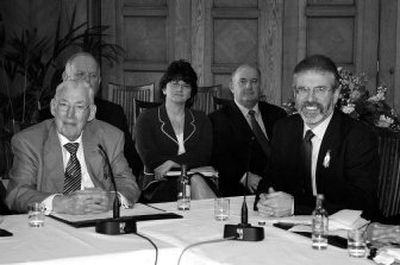In N. Ireland, old foes proclaim a new start

BELFAST, Northern Ireland – The leaders of two parties whose conflict fueled decades of violence in Northern Ireland held direct talks for the first time Monday and agreed to enter a power-sharing government May 8.
The meeting marked what many here hope will be the end of the strife that claimed 3,700 lives over three decades. It also set the stage for the Rev. Ian Paisley, the 80-year-old standard-bearer of pro-British unionism in Northern Ireland, to become the province’s first minister within six weeks.
Sinn Fein leader Gerry Adams, who has spent much of his political life battling to end British rule in the province and unite with Ireland, agreed to delay an official transfer of power until May. “I believe the agreement … marks the beginning of a new era of politics on this island,” Adams said.
His lieutenant, Martin McGuinness, is expected to be named deputy first minister in the new joint administration.
“Everything we have done over the last 10 years has been a preparation for this moment,” British Prime Minister Tony Blair said, calling the meeting in Belfast, the provincial capital, “a remarkable coming together of people who have, for very obvious reasons, been strongly opposed in the past.”
Meeting in the ornate dining room at Stormont, the seat of Northern Ireland’s parliament, Paisley and Adams sat together at a diamond-shaped table, accompanied by party colleagues. The two leaders appeared cordial and relaxed as cameras were brought in after the meeting, despite tensions during the previous 24 hours of negotiations.
For years, Paisley refused to hold direct meetings with Adams, would not consider joining a government with him and would not look his way if they passed in the hall.
The sight of the two of them striding separately into the same room for a meeting Monday was enough to fill Stormont’s lobby with chattering civil servants, visiting schoolchildren and journalists.
“We must not allow our justified loathing of the horrors and tragedies of the past to become a barrier to creating a better and more stable future,” Paisley said afterward. “In looking to that future, we must never forget those who have suffered during the dark period from which we are, please God, emerging. We owe it to them to craft and build the best future possible.”
Adams said the agreements showed the potential of what was possible with a power-sharing government.
“The relationships between the people of this island have been marred by centuries of discord, conflict, hurt and tragedy,” he said. “We have all come a very long way in the process of peacemaking and national reconciliation.”
The issue of a united Ireland is left for the future, with current agreements calling for Northern Ireland residents to decide the issue in a possible referendum.